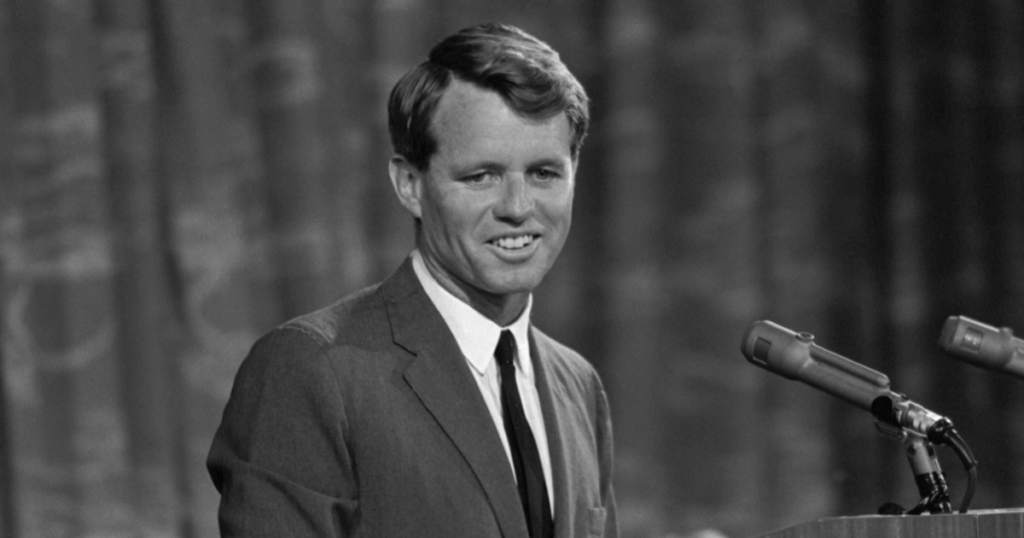The Half-Century What If?
How would our lives be different if RFK had not been assassinated?

Anniversaries are a tempting time to indulge in counterfactuals. In one such alternate universe, Robert F. Kennedy would be a year younger than Jimmy Carter and celebrating his 93rd birthday this year. Instead, it’s now the 50th anniversary of RFK’s mortal wounding on June 5, 1968, shot at the Ambassador Hotel in Los Angeles while celebrating his victory in California’s democratic presidential primary.
For a 21-year-old U.S. Army draftee, as I was then, news of the assassination came crackling over a bunkmate’s transistor radio. Though groggy from fitful, too-short sleep, suddenly I awoke to a pain that would last a half-century, shocked into consciousness by the unthinkable: another assassination—it can’t be!—coming a mere two months after the murder of Martin Luther King Jr., and not even five years since RFK’s own brother, President John F. Kennedy, had been killed. A single violent act can perhaps be understood as random; but this series suggested a horrifying pattern. Even self-medication could not assuage the psychic ache from this new knowledge that if something bad happens, it can always get even worse. Was this what was meant by Weltschmerz? James Joyce’s nightmare of history, from which you can never awake?
In the counterfactual universe in which RFK is not assassinated, what would have then happened? Would he have won the Democratic nomination, defeating senators Eugene McCarthy and Hubert Humphrey? Would he then have gone on to beat Richard Nixon? So that Watergate would never become more than a Washington, D.C., address? So the war could have ended much sooner?
Any cause-and-effect clarity becomes impossibly muddied in the jumble of events between then and now. So perhaps the only thing for sure in that “what-if” scenario is the inevitability of another assassination—if not in June 1968, then sometime not long thereafter; if not of Kennedy, then some other politically prominent presidential hopeful. There but for the grace of God, go … It took RFK’s death to prompt Secret Service protection of presidential candidates.
“Rebellion is a good thing.” Bobby Kennedy smiled wryly when he said it, just weeks earlier to a crowd of several hundred mostly University of Pennsylvania students, at a Philadelphia campaign rally. “But if I’m elected, don’t do that!” He looked up, teeth flashing in his signature boyish grin. Everyone cheered.
I was in the crowd. Stationed at nearby Ft. Dix, New Jersey, I hadn’t told my commanding officer that I was taking a day’s leave to go to a political rally. Did I actually have to lie? I don’t remember. But I do remember this feeling, and it was honest: My loyal heart was with McCarthy, since he was the first candidate to challenge the incumbent president, Lyndon B. Johnson; but the energy of Kennedy’s candidacy could not be ignored. I felt compelled to bear witness. Now, as his address ended, I found myself in the ecstatic mob chasing after his motorcade. He was standing in the back of a convertible, smiling and waving. Outstretched hands reached out to shake his, the very opposite of an assassin’s touch. Soon cufflinks had been pulled from his dress shirt’s white sleeves. Just as the car accelerated away, the tips of my upstretched fingers touched his.
In reconstructing this scene a half-century later, I find floating in my mind the ceiling of the Sistine Chapel, Michelangelo’s painting of God reaching out to touch Adam. RFK certainly wasn’t divine, and the brief electric touch of fingertips didn’t impart life. But it did—just as certainly—make me feel that I could believe in something larger than myself. Do any current politicians arouse such life-affirming feelings? But when posing that rhetorical question, I must also not be afraid to ask if mine is not just an oldster’s lament—as much sentimental testament to long-lost youth and innocence as objective commentary on America’s historical trajectory. Perhaps the best explanatory narrative lies in physics: Time’s Arrow goes one way only.

